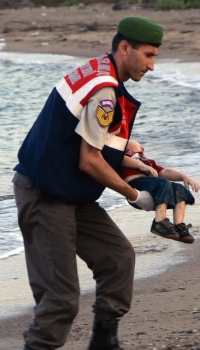Atithidevo Bhava, meaning the guest is equal to God, is a Sanskrit verse, taken from an ancient Hindu scripture, and had become part of the code of conduct for Hindu society. Usually quoted as correct behavior, the adage underpins the attitude India shows to not just visitors but all those who seek refuge in this great subcontinent.
Against this backdrop, the aggression with which the European countries are reacting to the flood of desperate refugees from Syria and other ISIS-occupied regions has been incomprehensible to Indians. Images of barbed wire, police violence, restraining camps, journalists kicking refugees and drowned children have shocked Indians into near-silence. There has not been the expected vociferous, emotional outburst because most people, here, are flabbergasted why countries with low population and economically stable governments find it so difficult to host these refugees.
After all, India has an age-old heritage of hosting refugees.
As early as 11th century has seen an influx of Zoroastrians into India from Iran as much due to religious intolerance in their homeland as for economic reasons. By the 16th century, history records persecution brought more Iranians to the Indian soil. There is the story of a 12th-century Hindu king presenting a vessel brimming with milk to a group of Zoroastrians, who landed on the coast of his kingdom. It was a gentle indication that his kingdom was so full of peopel that there was no place for more. The Zoroastrian chief added a pinch of sugar to the milk to say like sugar merges into the milk without spilling it, so will they merge into the local populace without a ripple. And they stayed, freely practising their religion and customs, becoming the indigenous Parsi community.
Wars, religious persecution, communal strife happening anywhere in Asia and refugees have poured into India. Partition of the Indian subcontinent into two nations witnessed massive population exchanges. Once lines had been established about14.5 million people had crossed the borders to what they hoped was the relative safety of religious majority. When China invaded Tibet, ethnic Tibetans along with their religious leader, the Dalai Lama, crossed into India and they remain even now. Formation of Bangla Desh brought another outpouring into the neighbouring Indian state of West Bengal, which continues till today. Communal wars in Sri Lanka and the Tamils sailed for the Indian coastline. The recent violence in Nepal has made the Indian Government gear up for a refugee trail wending through Bihar and Uttar Pradesh. These have been major tumultuous events hiking the refugee population in India but throughout the ages there have been trickles whether from erstwhile Burma (Myanmar) or the present ISIS-occupied regions such as Syria.
But never has there been so much ‘sound and fury signifying nothing’ about refugees as is being heard across the world, today. India has hardly exploded with the noise of how refuges are to be accommodated and whether they affect the nation’s economy. Straining under the burden of a 1.28 billion people, insufficient land area and a developing economy, India accepts everyone without a murmur. Whether she has the means, she is blessed a large and generous heart----a true mother. The so-called developed and civilized world, that shouts from rooftops of their philanthropy, can learn a lesson or two in the art of tolerance, humanity and sheer civilized behavior from India.
All rights reserved. @Sutapa Basu 2015
